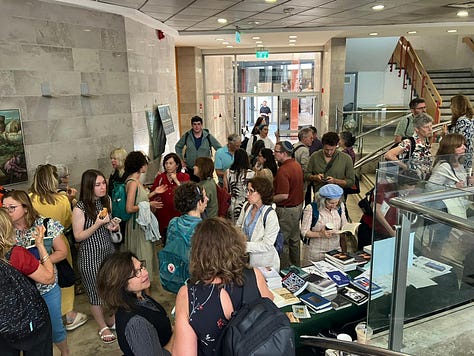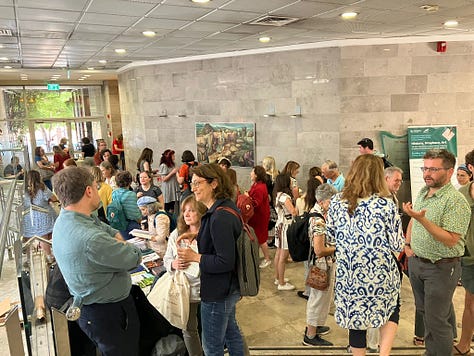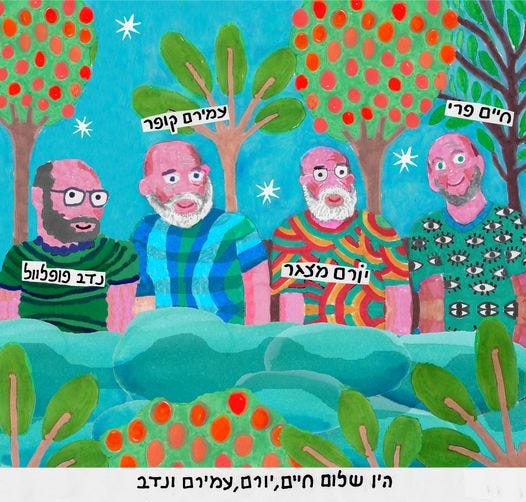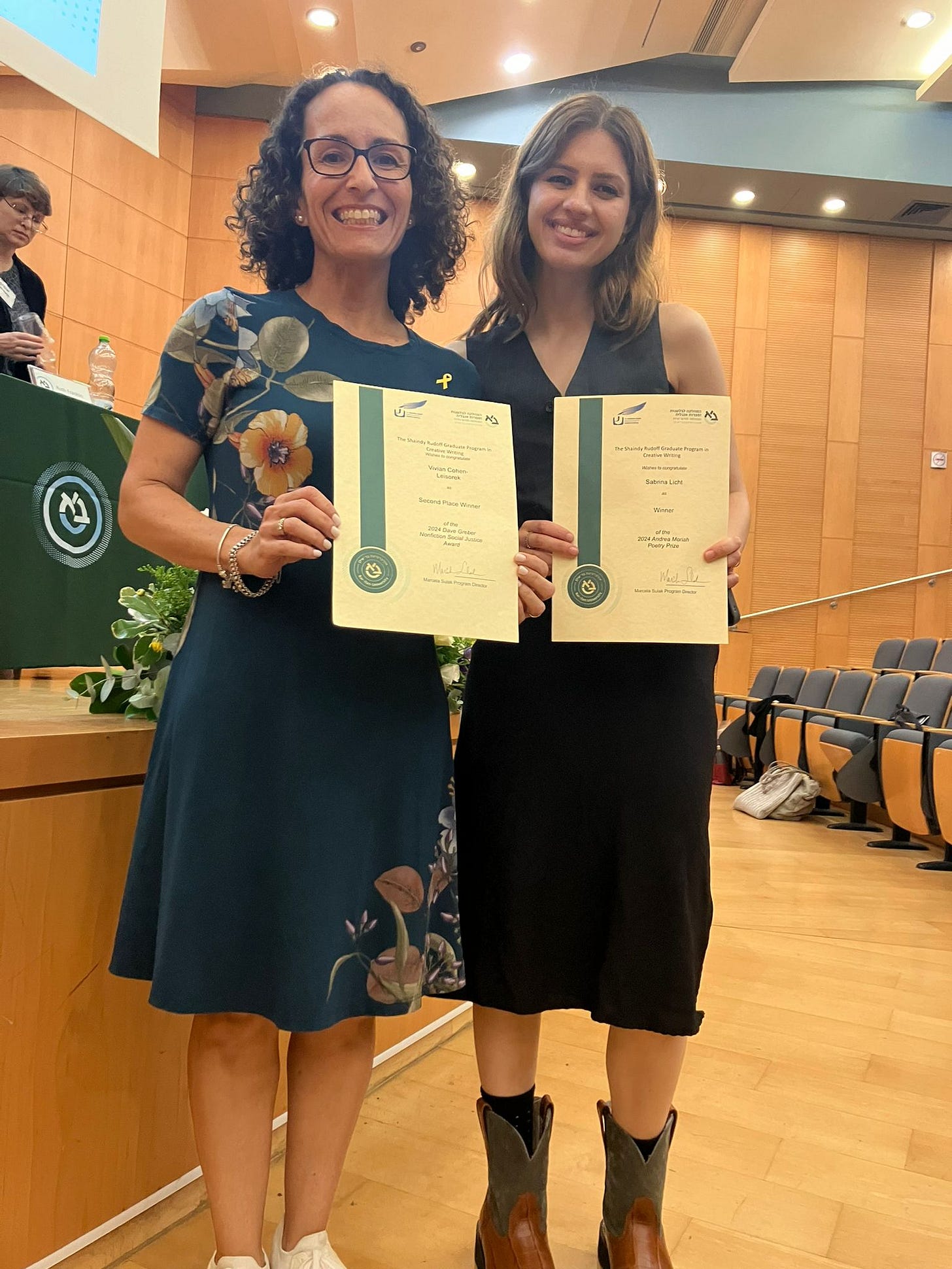In this morning’s monologue at the top of her weekly radio program, Ilana Dayan, Israel’s most prominent journalist, described the past week as “particularly dire - even by the standards of the post October 7th world.”
On Sunday, the Supreme Court held a hearing on whether the country will one day conscript the ultra-orthodox. On Monday we heard that the body of presumed hostage Dolev Yehud (35) was found in Nir Oz, where he had volunteered as a medic on October 7th. Monday night, the IDF announced the deaths in captivity of Chaim Peri (79) Amiram Cooper (84,) Yoram Metzger (80), and Nadav Popplewell (51.) On Tuesday, Israel’s North was on fire. And yesterday, ministers and members of Knesset proved yet again how utterly disconnected they are from reality, and from the people they purport to represent.
The “daily postcard” by artist Zeev Engelmeyer this week, saying goodbye to Haim, Yoram, Amiram and Nadav.
I write this early on Thursday after my oldest daughter called to tell me that Refael Kauders, the victim of yesterday’s drone attack by Hezbollah, was the brother of a staff member of her pre-army program. They’re organizing yet another bus to the shiva next week. “Oh, and did you hear about N?” she added. She was referring to one of B’s close friends from high school. Yes, I had heard — I had run into a former teacher last night, and she had told me N’s tank was hit by an RPG in Gaza. But there was excellent news: he had only needed knee surgery. N’s teacher even showed me her phone, excited that he had answered her text message.
And today, the (unsurprising) news that Hamas has rejected the proposed hostage deal. A lifeline for Bibi’s coalition of extremists, who won’t need to make good on their promise to leave the government until we reach “total victory.” But yet another terrible blow to the hostage families and to those of us who realize that the only possible solution is diplomatic. And on a personal level, when I know B is in a base in the south, waiting for his unit to be called back in.
Every morning, I feel like I need to leave the house with a bulletproof vest to protect me from the news, and blinders to keep my focus on what needs attention: work, ensuring there’s food in the house, my soon-to-be-completed thesis, being “present” for my husband and kids. I also spend a lot of energy avoiding what poisons me: the words of almost any minister given a microphone, the stupidity of social media, the background chatter of the news.
Amidst all the chaos, I spent three days at the Shaindy Rudoff Writers Conference in Bar-Ilan University this week. I was a volunteer in the event, so in between each panel or workshops, I was selling books or guiding people to the building or rushing to the caterer’s office to get more drinks or order more sandwiches or catching up with former classmates from the creative writing program that I hadn’t seen in months or years. And I admit, I was happy to be busy.
The speakers were outstanding. Joshua Cohen, who had an especially insightful conversation about the writing process with Evan Fallenberg. Literary critic and author
, whose eloquence and insights blew me away. And the brilliant, down-to-earth storyteller Iddo Gefen, whose unpretentious manner is matched only by his humor and imagination. I was also fortunate to meet good friends and mentors who came back to read from their newly published and upcoming work, (including the amazing , author of The Book of Jeremiah, Jennifer Lang, author of Places We Left Behind, and author of The Book of Noah.)





Also, my newest essay, “The Geography of Loss,” won second place in the Dave Greber Prize for Social Justice (the nonfiction category.) I shared the stage with a Palestinian-Israeli (winner of the translation prize), and Israelis originally born in the US (winner of the Fiction prize), Canada (first place in CNF) and, will you believe it — another Guatemalan (!!) — the winner in the Poetry category.
Two Guatemalans showing off after the 2024 CW Prize Ceremony.
It was exhausting. And fun. And difficult, because it wasn’t like we had escaped to a different planet: current events made their way into every speech, every intro, and almost every conversation on stage or writing exercise in the workshops… and especially into the audio shared by Mitch Ginsburg and Mishy Harman of Israel Story. But it helped me put things in perspective. It was also comforting to hear the rest asking the same question, such as what is the role, if any, of art and literature when our country is literally on fire, or about the power/powerlessness to change. It was also a good time to hear what we so often forget: that art can teach us to listen, to hold opposing ideas in our heads, and especially, to one another and ourselves.
Tomorrow will mark eight months since the war. And while I’m not especially optimistic about the present (or the future,) these days, spending time at the conference was a reminder that art, while it can’t make our horrible reality disappear, can help us feel a bit more human again.





OMG!! I spent all day with you on Tuesday and you did not mention winning second place in the Dave Greber Prize for Social Justice in the nonfiction category!! Mazal tov!! (And thank you for this post, as always...)